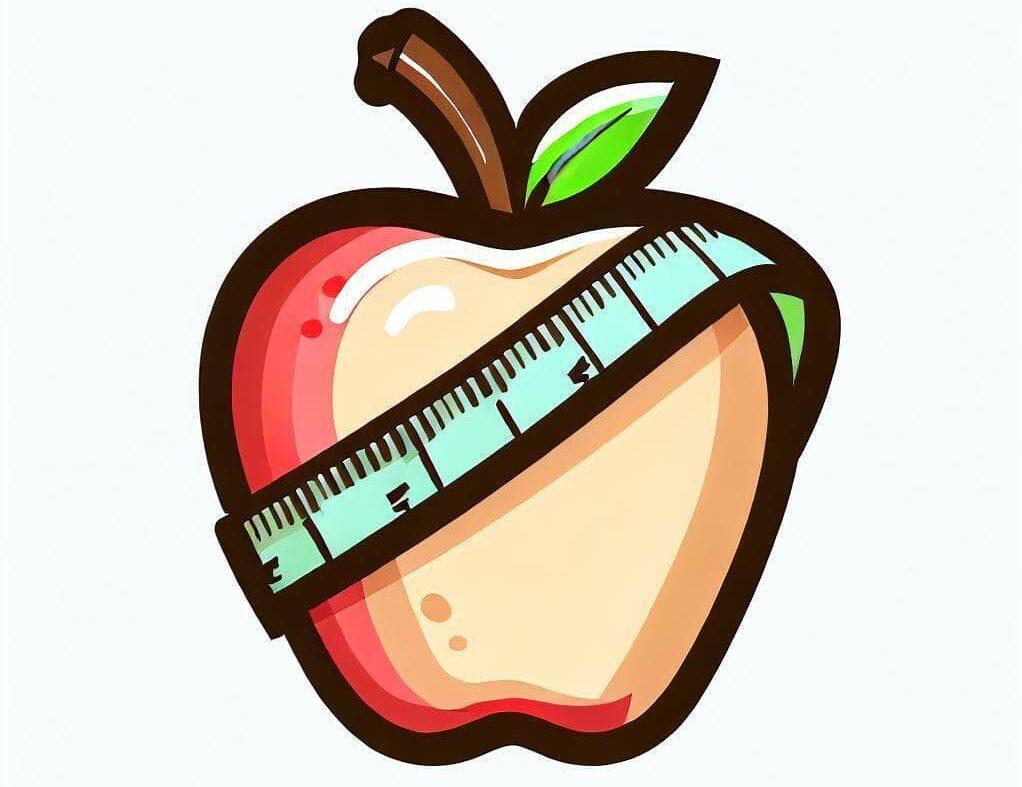Best Sleeping Position For Weight Loss
This post may contain affiliate links which means I may receive a commission for purchases made through links at no extra cost to you. See my disclosure policy for more information.
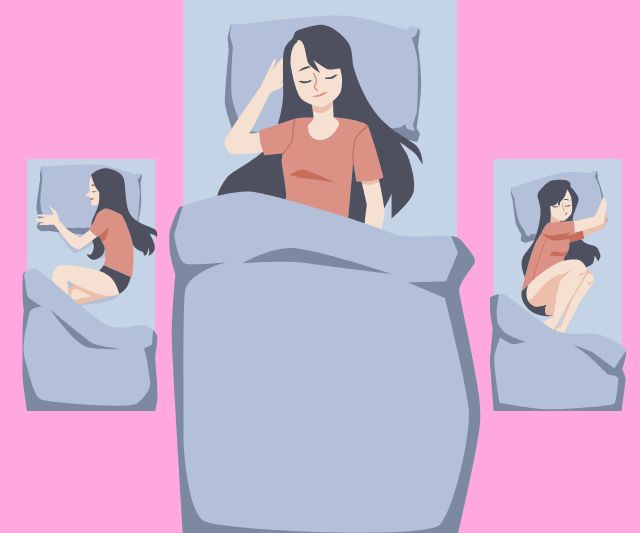
Look, I get it. You want to lose weight and you want to make sure that everything that you do from eating, drinking, exercising, or sleeping is perfect.
Sleeping is a huge part of our lives. In fact according to dreams.co.uk. We spend around 26 years sleeping and an additional 7 years trying to sleep (the nights when you stay up and stare at the ceiling). Shocking right?
So the point is that it’s completely logical to wonder what is the best sleeping position for weight loss. You know what, let’s just dive into it and find that answer for you.
Sleeping on Your Back
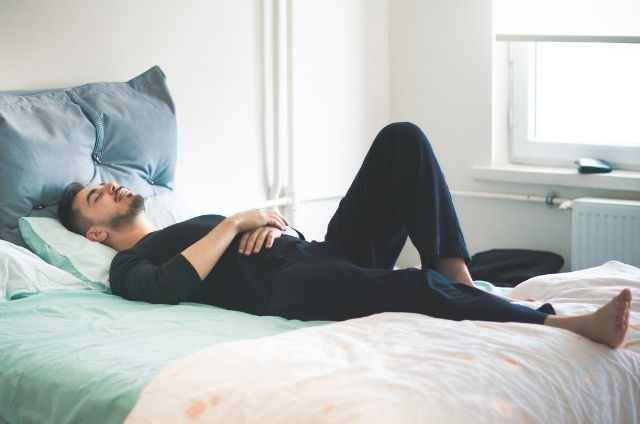
Let’s talk about sleeping on your back, also known as the supine position. In this case, ‘supine’ means lying face up, like a starfish sprawled out on the beach.
Now, you’re probably asking, “How does starfishing help me in reducing belly fat?” Well, when you sleep on your back, your body weight is evenly spread out.
This prevents the creation of pressure points that could cause discomfort and wake you up in the middle of the night.
But the real star of the show here is the alignment of your head, neck, and spine. When these are in line, it prevents conditions like sleep apnea.
If you’ve never heard of it, sleep apnea is a disorder where your breathing stops and starts while you sleep. It’s as scary as it sounds, and it can mess with your body’s metabolism – the process that converts food into energy.
A disrupted metabolism can lead to weight gain. So, getting a good night’s sleep is crucial in keeping your metabolism running smoothly and burning that stubborn belly fat.
Right Side Sleeping
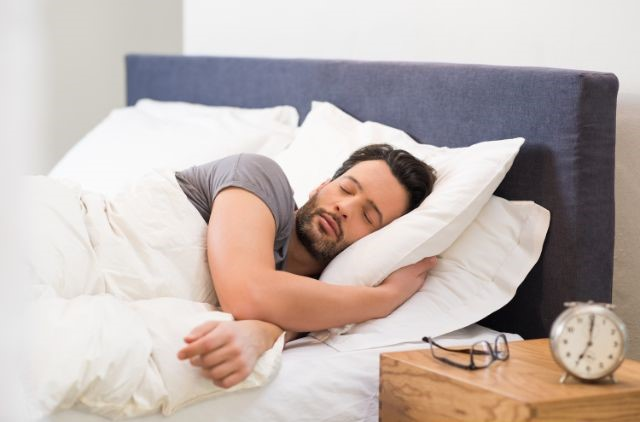
Let’s flip over to the right side. Sleeping on your right can be beneficial for a couple of reasons. First, it helps with digestion.
Imagine a waterslide – the steeper it is, the faster you’ll slide down, right? Similarly, when you’re lying on your right side, gravity helps your digested food move more efficiently through your intestines, boosting gut health, and indirectly supporting weight loss.
Second, the right-side position could be good for your heart as it minimizes the load on it while you’re snoozing away.
But remember, everyone’s different, and what works best for one person may not work for another, so always listen to what your body is telling you.
Left Side Sleeping
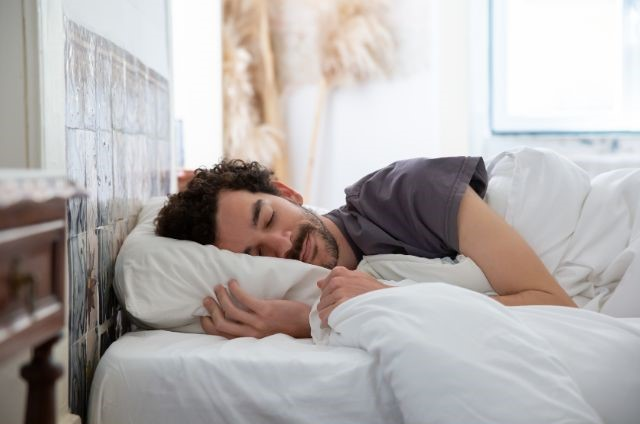
Now, onto the left-side position. This position is often recommended for pregnant women to improve circulation to the heart, benefitting both mom and baby.
For the rest of us, this position may alleviate heartburn and acid reflux, especially if you’ve had a late-night pizza binge.
It’s all about the gravity game again, helping to keep your stomach acid from making an unwelcome appearance in your esophagus.
Stomach Sleeping
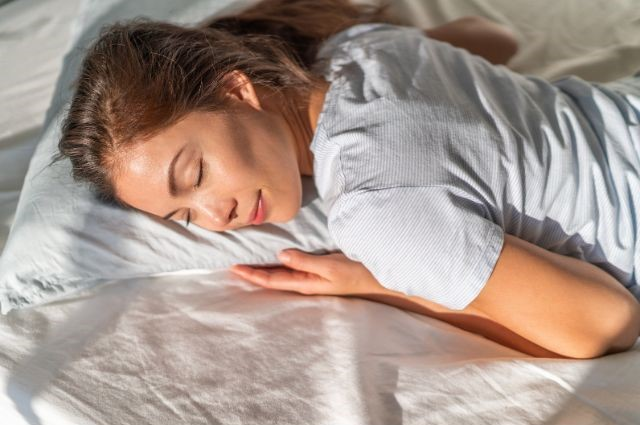
Stomach sleeping, or the prone position, is a bit like the bad boy of sleeping positions – enticing but potentially problematic.
While this pose may decrease snoring and help with some cases of sleep apnea, it can also cause neck and back pain.
You know how it feels when you’ve been sitting hunched over your laptop for too long? That’s because the position isn’t natural for your spine.
The same goes for stomach sleeping. However, if you’re a die-hard stomach sleeper and wake up feeling refreshed, then it’s all good.
Multiple Pillow
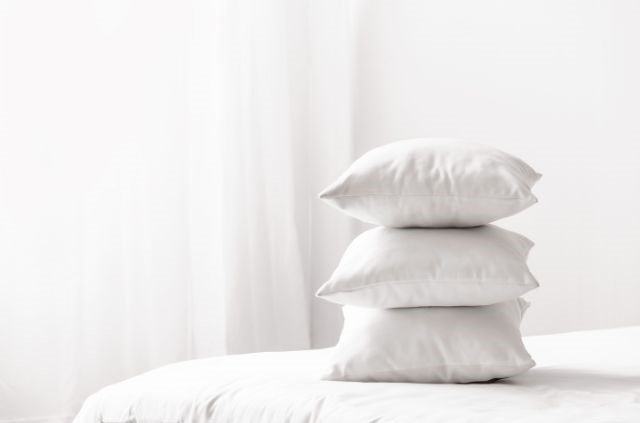
Think of pillows as your magic sleep accessories. They’re not just there to look pretty; they can really step up your sleep game.
By using an extra pillow to raise your head, you can keep that pesky acid reflux at bay.
It’s all about the angles – raising your head higher than your stomach helps keep the acid where it belongs, instead of creeping up into your throat.
Better sleep means your body can effectively perform its overnight maintenance, including fat burning.
Pillow Between Your Legs

If you’re a side sleeper, here’s a hot tip: try placing a pillow between your legs. It’s not just about the comfort; it’s also about the alignment.
This position can help keep your hips, pelvis, and spine in a straight line, kind of like when you’re standing up.
This alignment helps you avoid discomfort and potential sleep interruptions, giving your body the rest it needs to recover and burn fat more efficiently.
Also Read: Best Time to Drink Kombucha for Weight Loss
Why Is a Good Night’s Sleep Important for Weight Loss?
Even if you find your perfect sleep position, why does it even matter if your goal is to reduce belly fat? Let’s find out.
The Dynamic Duo: Ghrelin and Leptin
Think of these two hormones as the little guys in your body that control your hunger signals. Ghrelin, the ‘hunger hormone’, is produced in your stomach and sends a signal to your brain when it’s time to eat.
On the other hand, leptin, the ‘satiety hormone’, is released from your fat cells and tells your brain when you’re full.
Now, here’s where the plot thickens. When you’re sleep-deprived, your body makes more ghrelin and less leptin.
So, you end up feeling hungrier and less satisfied after eating. It’s like your body’s prank on you, tricking you into eating more and, potentially, gain weight.
On the flip side, research shows that getting enough sleep helps keep these hormones balanced, which can aid your journey of losing weight.
Midnight Muscle Magic
While you’re off in dreamland, your body is busy at work repairing and rebuilding your muscles from your killer workouts.
This process is primarily driven by human growth hormone (HGH), which is released in large quantities during deep sleep.
More muscle mass means a faster metabolism, as muscles burn more calories than fat, even at rest. So, quality sleep essentially supports your body’s natural fat-burning ability.
Sleep and Metabolism
There’s a cozy relationship between sleep and your metabolism – the process by which your body converts food into energy.
Lack of sleep can mess with your body’s ability to metabolize carbs and control blood sugar levels, leading to an increase in fat storage.
Plus, poor sleep can lead to increased insulin resistance, a risk factor for both weight gain and serious conditions like type 2 diabetes.
Appetite Regulation
Do you know that irresistible urge for a midnight snack during your late-night Netflix binge? Well, sleep has a major role in regulating these cravings.
Sleep deprivation increases cravings for high-calorie, carb-rich foods by influencing brain regions that control reward processing.
It’s like your brain’s way of seeking extra energy because it senses fatigue due to poor sleep.
Also Read: Is Iced Coffee Good for Weight Loss?
Tips to Improve Sleep Hygiene Practices For Weight Loss
Alright, now that we’ve got sleeping positions covered, let’s move on to some more sleep habits that can supercharge your weight loss journey. Imagine these tips as secret weapons in your fitness video game – you might not need them to play, but they can level up your performance big time.
Get in Sync with Your Circadian Rhythm:
Your body has a natural time-keeping clock known as your circadian rhythm. It’s like an internal metronome that plays a key role in regulating your sleep-wake cycle.
By sticking to a consistent sleep schedule, you can help regulate this rhythm, leading to more refreshing sleep.
Consistent sleep times can also help regulate your appetite and metabolism, two factors crucial for weight management.
When your sleep schedule is erratic, it can throw off your body’s hunger hormones (ghrelin and leptin), making you feel hungrier and potentially leading to weight gain.
So, let’s aim for at least 7 hours of sleep per night, and keep those bedtimes and wake-up times consistent!
Transform Your Bedroom into a Sleep Haven
You wouldn’t run a marathon in flip-flops, right? So, why expect a good night’s sleep in a less-than-ideal environment?
A cool, dark, quiet bedroom can help signal your brain that it’s time to sleep. This is partly because cooler temperatures can aid your body’s natural dip in temperature to initiate sleep.
Plus, darkness helps stimulate the production of melatonin, the hormone that regulates your sleep-wake cycle.
Invest in blackout curtains, earplugs, a fan, or a white noise machine if necessary. A comfortable mattress and pillows are also a must.
The better you sleep, the more regulated your hormones will be, which helps control your appetite and maintain a healthy weight.
Power Down to Tune In
Ever notice how you feel more awake after scrolling through your phone in bed?
That’s because the blue light emitted from electronic devices can suppress melatonin production, making it harder to fall asleep.
Less sleep can interfere with your metabolism and increase cravings for unhealthy food.
Try making your bedroom a tech-free zone, or at least turn off these devices an hour or two before bed to help your body wind down naturally.
Eat Smarter, Not Later
Remember the adage, “Eat breakfast like a king, lunch like a prince, and dinner like a pauper”? It turns out there’s some wisdom to it.
Eating a heavy meal or snacking late at night can throw off your body’s natural overnight fasting period (yeah, it’s a thing!), leading to weight gain.
Plus, lying down with a full stomach can cause discomfort and disrupt your sleep.
Try to finish eating a couple of hours before bed and make dinner your lightest meal of the day.
Get Moving
Regular physical activity, like walking, jogging, or even dancing in your living room, can help you sleep better by regulating your body’s internal clock and reducing stress.
But be careful not to work out too close to bedtime.
Exercise stimulates your body, which can make it hard to wind down. Aim to wrap up your workout at least three hours before you hit the hay.
Stress Less, Sleep More
Stress and sleep have a bit of a “chicken and the egg” relationship. Stress can make it hard to sleep, and a lack of sleep can make stress worse.
Techniques like deep breathing, meditation, or yoga can help relax your mind and body, making it easier to fall asleep.
Plus, good sleep can help keep your hunger and fullness hormones in check, helping prevent overeating and weight gain.
Also Read: Is Lipton Green Tea Good for Weight Loss?
Conclusion
So what are the best sleeping positions for weight loss? The answer is there ain’t one. Because it depends on what works for you.
Remember, you can’t lose belly fat sleeping, the goal is to have a good night’s sleep regardless of your position. As long as you don’t hurt your body by putting too much stress on one area you are fine.
Try experimenting with different sleep positions—right side, left side, back, or even stomach if it feels comfortable.
See how each one affects your sleep quality and how you feel when you wake up.
Also Read: Are Rowing Machines Good for Weight Loss?
FAQ
How should I sleep to lose belly fat?
There are no sleeping positions to lose belly fat, maintaining a regular sleep schedule and practicing good sleep hygiene can aid in overall weight management. Aim for 7-9 hours of quality sleep each night.
How do I burn fat at night while sleeping?
Your body naturally burns calories even when you’re sleeping. Improve this process by maintaining a consistent sleep schedule, creating a sleep-friendly environment, and practicing healthy habits like regular exercise and a balanced diet.
How can I flatten my tummy fast?
Quick fixes often don’t lead to lasting results. For sustainable changes, combine a balanced diet rich in lean proteins, whole grains, fruits, and vegetables with regular exercise. Include both cardio workouts and strength training, particularly exercises that target the abdominal muscles. Also, try to minimize stress and get adequate sleep.
This post may contain affiliate links which means I may receive a commission for purchases made through links at no extra cost to you. See my disclosure policy for more information.
Rahul is a professional nutritionist certified by the International Sports Sciences Association (ISSA) and a personal trainer certified through the American Council of Exercise (ACE). He has a special interest in the science of nutrition and how it can impact the body.
